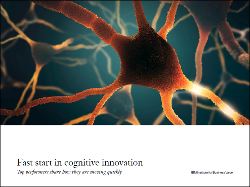Ungated Post | 31 Jan 2017
Fast start in cognitive innovation

How will cognitive computing transform lives, both personally and professionally? What can enterprises do to tap into cognitive computing’s full potential? What steps can leaders take today to accelerate cognitive computing benefits? In this survey of 6,050 C-suite executives worldwide, we explore these and many other questions. A small group of cognitive innovators show what can be done: Their most successful strategies combine cognitive and analytic capabilities – including machine and deep learning, natural language processing, descriptive and predictive analytics – as well as robotics and automation.
Oxford Economics worked with IBM’s Institute for Business Value in the second half of 2016 to field a survey among 6,050 global executives to investigate the effects of cognitive computing on various functions across the enterprise.
Oxford Economics’ team is expert at applying advanced economic tools that provide valuable insights into today’s most pressing business, financial, and policy issues.
Related Services

Post
The economic impact of abandoning the WTO
Oxford Economics have been commissioned by the International Chamber of Commerce (ICC) to provide an independent assessment of the economic impact of WTO dissolution. This report details our findings and the assumptions underpinning our analysis.
Find Out More
Post
The economic impact of the sports activities of public service media
This study shows how the sports activities of public service media supported €4.5 billion of GDP and 57,000 jobs across 31 European countries in 2022. The report also highlights wider economic benefits of public service media sports coverage, such as the way in which it leverages sponsorship income for sports bodies.
Find Out More
Post
Global Trade Education: The role of private philanthropy
Global trade can amplify economic development and poverty alleviation. Capable leaders are required to put in place enabling conditions for trade, but currently these skills are underprovided in developing countries. For philanthropists, investing in trade leadership talent through graduate-level scholarships is an opportunity to make meaningful contributions that can multiply and sustain global economic development.
Find Out More